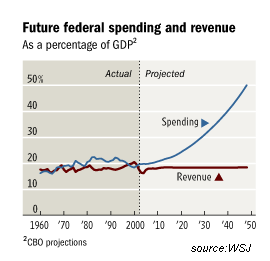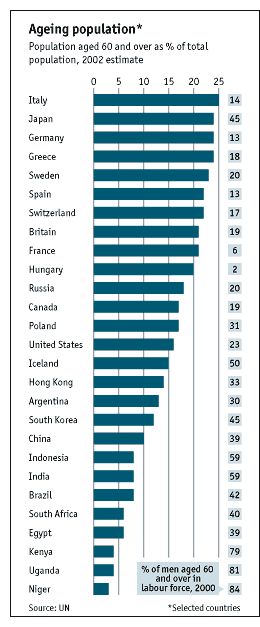

|
| weblog/wEssays | home | |
|
The Decline of Europe: A Demographic Done Deal? (December 13, 2005) At a dinner party a few years ago hosted by a close friend who happens to be Danish, the Europeans in attendance became visibly defensive when I raised the demographic specter of European decline. I wasn't trying to be "triumphant:" the U.S. and indeed most nations, developed and developing alike, face the same demogaphic problem: smaller workforces in each succeeding generation are being saddled with ever-more expensive benefits for their vast hordes of elders.  The problem for the U.S. is clearly visible in this chart to the right: the cost of
Medicare benefits for the Baby Boom will skyrocket while taxes (government income
needed to pay the benefits) flat-line due to the
shrinking worker base and the generous "tax cuts" awarded to the nation's wealthiest
citizens. (parentheses added to denote that "tax cuts" for the wealthy simply mean
their income is being subsidized by those with less political clout.)
The problem for the U.S. is clearly visible in this chart to the right: the cost of
Medicare benefits for the Baby Boom will skyrocket while taxes (government income
needed to pay the benefits) flat-line due to the
shrinking worker base and the generous "tax cuts" awarded to the nation's wealthiest
citizens. (parentheses added to denote that "tax cuts" for the wealthy simply mean
their income is being subsidized by those with less political clout.)
Even a schoolkid can see that this trend is unsustainable; benefits will have to be whacked down to what is affordable, or taxes will have to rise significantly. Everyone agrees cutting benefits is the way to go-- until they're the ones collecting the fat bennies. Then suddenly it's their "right." Hey pal, there are no "rights" to triple bypass surgery--there's only a social pact between generations. What struck me about the European's responses--one French biochemist even harumphed that demographics weren't very predictable--was the sense of denial implicit in their defensiveness. Yes, demographic trends are not entirely predictable, but we already know the cohort of French babies born today is not large enough to support the huge number of workers who will be retiring 20 years hence--that is already written in stone, and no sudden surge in French birth rates can change that.  The European economies, already burdened by high taxes, drag along at low growth rates
and high unemployment. Raising taxes in the EU nations is simply not an option. So the
only option open is exactly what they don't want to hear--cut benefits, and by a lot.
The European economies, already burdened by high taxes, drag along at low growth rates
and high unemployment. Raising taxes in the EU nations is simply not an option. So the
only option open is exactly what they don't want to hear--cut benefits, and by a lot.
In contrast, most young Americans seem resigned to the fact that Social Security will be bankrupt before they ever get close to retiring. Perhaps they shouldn't be so fatalistic, but they certainly aren't in denial; they know the current transfer of wealth from one generation to the next is unsustainable. All this is laid out in easily digestible form in the book Fewer: How the New Demography of Depopulation Will Shape Our Future Indeed, it is clear that the "economic miracle" of postwar European expansion was a demographic anomaly: a massive influx of workers and their "baby boom" offspring created high ratios (and thus highly affordable ratios) of 9 workers for every retiree. The rich benefits the "Continental model" governments of Scandanavia and Northern Europe lavished on their retirees and unemployed were easily affordable as long as there were 10 workers' taxes being collected to pay for every retiree. But alas, now that great cohort of Baby Boomers is retiring, and leaving behind a smaller cadre of workers in their wake; now the ratio of worker to retiree has shrunk to 3-to-1, and in within the next decade or so it will shrink to an impossible-to-sustain 2-to-1. The nations with the richest benefits--that is, European nations--will be the ones least able to afford those benefits, as their birthrates have dropped well under replacement (2.1 babies per woman of child-rearing age). France and a few others have birthrates of 1.9 or so, and modest immigration will keep their numbers more or less stable or growing ever so slightly; the rest of Europe will see their number steadily decline. Articles such as this one titled Birthrate Decline Clouds Europe's Future are now common. Indeed, a C.I.A. report issued earlier this year stated: "The current EU welfare state is unsustainable and the lack of economic revitalization could lead to the splintering or, at worst, disintegration of the EU, undermining its ambitions to play a heavyweight international role," according to the forecast released in January.Here is a link to the full European Commission Green Paper titled "Confronting Demographic Change." Thanks to a birthrate close to replacement and high immigration--no triumphalism here, just the facts--the U.S. will continue to grow in population from 300 million today to 420 million or perhaps 450 million by 2050. This doesn't mean we will escape the overburdening of our sons and daughters with impossible-to-pay Medicare benefits for the 65 million Baby Boomers, but it does give us "wiggle room" the European nations simply don't have. By raising taxes modestly now, and cutting Medicare and Social Security benefits modestly now, we might just squeeze through the wormhole and avoid bankrupting our nation. Or then again, with a "tax-cuts are always good" fantasy ruling both the administration and Congress--the same folks who are too lilly-livered to actually cut benefits or raise retirement ages--maybe not. * * * copyright © 2005 Charles Hugh Smith. All rights reserved in all media. I would be honored if you linked this wEssay to your site, or printed a copy for your own use. * * * |
||
| weblog/wEssays | home |